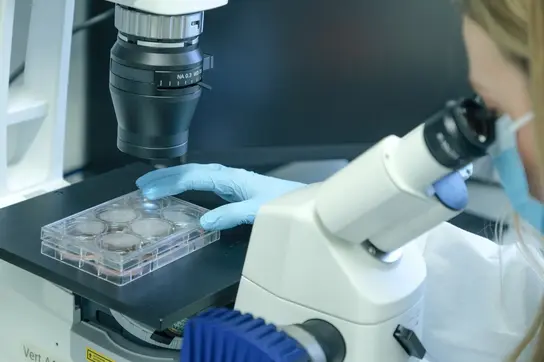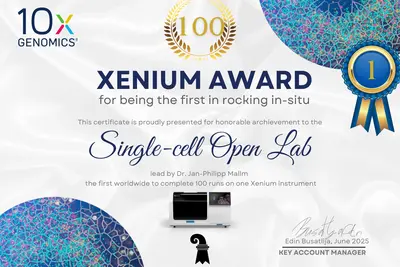Scientific Core Facilities and Services
Scientists at DKFZ and its partner sites have access to a broad portfolio of research infrastructures, including Core Facilities, as well as data management and IT-services. Core Facilities provide access to cutting-edge instrumentation, user support, and technology development. Data management and IT-services address IT infrastructure needs and offer tools for organizing and managing research data properly.

News from our Core Facilities

Date/Time: Monday, 17 November 2025, 3:00 pm
Location: DKFZ, Room A0.106 (ATV/IIC, Ground Floor)
Speakers:
- Dr. Jens Peter Gabriel (Leica Microsystems): Breaking Speed Barriers – Unveiling Insights with Label-free Chemical Imaging
- Prof. Dr. João Seco (Heidelberg University & DKFZ): Lipid Droplets in Radiation Response: Raman Spectroscopy Benefits
What’s it about?
Label-free chemical imaging such as SRS and Raman microscopy visualizes cellular chemistry via molecular vibrations—no dyes needed—enabling fast, gentle insights into metabolism, dynamics, and radiation response.
Contact: Felix Bestvater, f.bestvater@dkfz.de

The Light Microscopy Core Facility is pleased to announce the installation of the new Sartorius Incucyte SX5 live-cell imaging system.
The SX5 enables automated, long-term imaging in a controlled incubation environment with integrated remote monitoring of experiments, as well as real-time analysis of cellular dynamics. Available analysis modules include Cell-by-Cell, Scratch Assay, and Spheroid, supporting a wide range of applications from single-cell tracking to 3D invasion measurements.
Compared to the previous Incucyte S3, the SX5 offers an expanded triple-band filter set (green/orange/far-red), improved optics and autofocus, and higher camera sensitivity for superior image quality.
For access, training, or questions, please contact lichtmikroskopie@dkfz.de

A major milestone at our Single-cell Open Lab
Our Xenium platform from 10x Genomics is the first worldwide to cross the 100-run mark!
The system enables the detection of up to 400 transcripts in fresh frozen and FFPE samples, applies rolling circle reaction signal amplification, and allows 5k panel runs.
Many thanks to all users and the Core Facility team led by Jan-Philipp Mallm for making this achievement possible.

Did you know? The DKFZ Core Facilities are now on LinkedIn! We share exciting insights into our technologies, updates, and news from the Core Facilities.
Follow us and stay informed:
DKFZ Core Facilities and Services are listed below according to their area of specialty.
Genome, Epigenome & Transcriptome
The NGS Core Facility provides highly parallel DNA and RNA sequencing services based on the Illumina MiSeq, NextSeq and NovaSeq technologies as well as on the Oxford Nanopore technologies.
More info about the Next Generation Sequencing Core Facility
The Microarray Core Facility provides state-of-the-art microarray technologies for Expression Profiling, Methylation Analysis, Genotyping/Copy-Number-Variation(CNV). High-throughput protein analysis utilizing cutting-edge Olink® technology, kinase activity profiling as well as assisted access to ddPCR and qPCR instruments and Ingenuity are also part of our service portfolio.
The Single-cell Open Lab provides an infrastructure for processing cells, preparing libraries for single-cell sequencing as well as spatial omics.
Proteome
The unit provides mass spectrometry based Proteomics. State-of-the-art hardware in combination with specialized workflows allows most sensitive and in-depth Proteome analysis.
The Single-cell Open Lab provides an infrastructure for processing cells, preparing libraries for single-cell sequencing as well as spatial omics.
The Microarray Core Facility provides state-of-the-art microarray technologies for Expression Profiling, Methylation Analysis, Genotyping/Copy-Number-Variation(CNV). High-throughput protein analysis utilizing cutting-edge Olink® technology, kinase activity profiling as well as assisted access to ddPCR and qPCR instruments and Ingenuity are also part of our service portfolio.
The Antibodies Core Facility offers the production of monoclonal (mouse/rat) antibodies using the hybridoma technology and the production of polyclonal (guinea pig) ABs. In addition the Antibodies Core Facility offers antibody sequencing, engineering and recombinant expression.
Metabolome
The Metabolomics Core Technology Platform (MCTP) is a core facility of Heidelberg University and officially collaborates with DKFZ. It is localized within the Centre for Organismal Studies. We offer a broad range of qualitative and quantitative metabolomics services from diverse sample matrices to all DKFZ groups as internal users.
Cellular and Preclinical Imaging
The Electron Microscopy Core Facility performs experiments in full service for ultrastructural studies by TEM as well as SEM.
The Light Microscopy Core Facility offers a variety of advanced imaging-related services at several locations on the campus. We provide consultation, hands-on training, technical support and open access (24/7) to cutting-edge instrumentation and a broad range of applications.
The Small Animal Imaging Center supports users in the application of numerous radiological methods such as ultrasound, optical imaging, µPET, µCT, µSPECT and MRT measurements to collect and quantify morphological and functional data in vivo.
The service Unit for Radiopharmaceuticals and Preclinical Studies provides consultation and support in imaging and irradiation design/irradiation for preclinical studies as well as in experimental design for animal studies.
More info about the Service Unit for Radiopharmaceuticals and Preclinical Studies
Cytometry and Screening
The Immune Monitoring Unit supports oncology studies (IITs or industry-sponsored studies) of all phases using various state-of-the-art immunological analysis techniques.
The Flow Cytometry Core Facility advises and supports scientists in the planning, execution and evaluation of flow cytometry analyses and cell sorting. Modern instruments (analytical instruments and cell sorters) as well as various software are available for this purpose.
More info about the Flow Cytometry Core Facility
The Chemical Biology Core Facility (CBCF) offers infrastructure and expertise for high throughput screenings of small molecules against biological targets of interest. Support and consultancy are provided for assay development, especially suited for high-throughput experiments. Thus the aim of the CBCF is to enable research groups to identify and develop small active compounds which will be essential for addressing biological questions and/or being starting points for drug development.
More info about the Chemical Biology Core Facility
Whole Tissue Analysis
The Immune Monitoring Unit supports oncology studies (IITs or industry-sponsored studies) of all phases using various state-of-the-art immunological analysis techniques.
The Light Microscopy Core Facility offers a variety of advanced imaging-related services at several locations on the campus. We provide consultation, hands-on training, technical support and open access (24/7) to cutting-edge instrumentation and a broad range of applications.
The Single-cell Open Lab provides an infrastructure for processing cells, preparing libraries for single-cell sequencing as well as spatial omics.
Reagents and Resources for Cancer Research
The Antibodies Core Facility offers the production of monoclonal (mouse/rat) antibodies using the hybridoma technology and the production of polyclonal (guinea pig) ABs. In addition the Antibodies Core Facility offers antibody sequencing, engineering and recombinant expression.
The Cellular Tools Core Facility offers standardized vector and clone resources as well as modular services for cell-based gain- and loss-of-function technologies.
The Dieter Morszeck Biorepository is a fully automated cold storage facility in which valuable liquid biospecimens can be stored.
More info about the Dieter Morszeck Biorepository
The service Unit for Radiopharmaceuticals and Preclinical Studies provides consultation and support in imaging and irradiation design/irradiation for preclinical studies as well as in experimental design for animal studies.
More info about the Service Unit for Radiopharmaceuticals and Preclinical Studies
Animal Services
The Center for Preclinical Research (ZPF) advises and assists researchers in the design and realization of their animal experiments. It consists of four subdivisions: Central Animal Laboratory, Tumor Models, Microbiological Diagnostics and Transgene Service.
Research Data Management
The Omics IT and Data Management Core Facility (ODCF) provides high-throughput computing, data management and basic bioinformatics services to groups at the DKFZ and their collaborating partners.
More info about the Omics IT and Data Management Core Facility
Library and IT Services
The Information Technology Core Facility (ITCF) is responsible for optimum usage of IT at DKFZ, for supporting staff of all departments in matters of choosing IT tools for their special needs as well as for providing central IT Services and support which are essential for everyone at DKFZ.
The Library provides among other things scientific literature and information needed by the scientists of the German Cancer Research Center.
Enabling Technology Department
The Enabling Technology Department is headed by the Chief Enabling Technology Officer Prof. Elisa May. She oversees the following Core Facilities: Antibodies, Cellular Tools, Chemical Biology (with EMBL), Dieter Morszeck Biorepository, Electron Microscopy, Flow Cytometry, Light Microscopy, Microarray, Next Generation Sequencing, Proteomics, Single Cell OpenLab, Small Animal Imaging, and the Scullery. The Department is also involved in two projects on biomage data management: the DFG project "Information Infrastructure for BioImage Data Management – I3D:bio", and the consortium "NFDI4BioImage" in the National Research Data Infrastructure NFDI, where Prof. May serves as a Co-Speaker.
-
-
-
-

Dr. Christian Schmidt
Scientific Project Manager and Research Data Management Microscopy
+49 6221 42 2657 -




